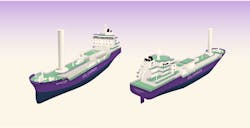Northern Lights CCS charters liquefied CO2 ships
Northern Lights JV DA has chartered two 7,500-cu m liquefied CO2 ships from Kawasaki Kisen Kaisha Ltd. (K Line). The ships, from China’s Dalian Shipbuilding Industry Co., will be delivered in 2024 for use in Northern Lights’ North Sea carbon capture and storage (CCS) project.
The trips will transport liquefied CO2 from industrial emitters—including the Norcem Brevik cement and Hafslund Oslo Celsio energy-from-waste plant’s carbon capture sites—to the Northern Lights CO2 receiving terminal in Øygarden, Norway.
Northern Lights and K Line will jointly establish operational procedures for safe transportation of liquefied CO2. The ships are classified by DNV and will be registered in Norway and operated under Norwegian flag by mainly Norwegian shipboard personnel.
London-based K Line subsidiary K Line LNG Shipping (UK) Ltd. will manage the two ships.
Northern Lights is developing infrastructure to transport CO2 from industrial emitters by ship to its Øygarden receiving terminal in western Norway for intermediate storage before transport by pipeline for permanent storage in a geological reservoir 2,600 m under the seabed.
The venture last month concluded drilling operations for CO2 injection well with its storage license EL001 in the North Sea about 70 km west of Bergen, Norway. Preliminary results confirmed storage capacity of at least 5 million tonnes/year, sufficient for the project’s first two phases (OGJ Online, Nov. 11, 2022). Operations are scheduled to start in 2024, with additional shipping and storage capacity to be developed as demand grows.
Northern Lights JV DA is owned equally by Equinor ASA, Shell PLC, and TotalEnergies SE.
About the Author
Christopher E. Smith
Editor in Chief
Chris joined Oil & Gas Journal in 2005 as Pipeline Editor, having already worked for more than a decade in a variety of oil and gas industry analysis and reporting roles. He became editor-in-chief in 2019 and head of content in 2025.

